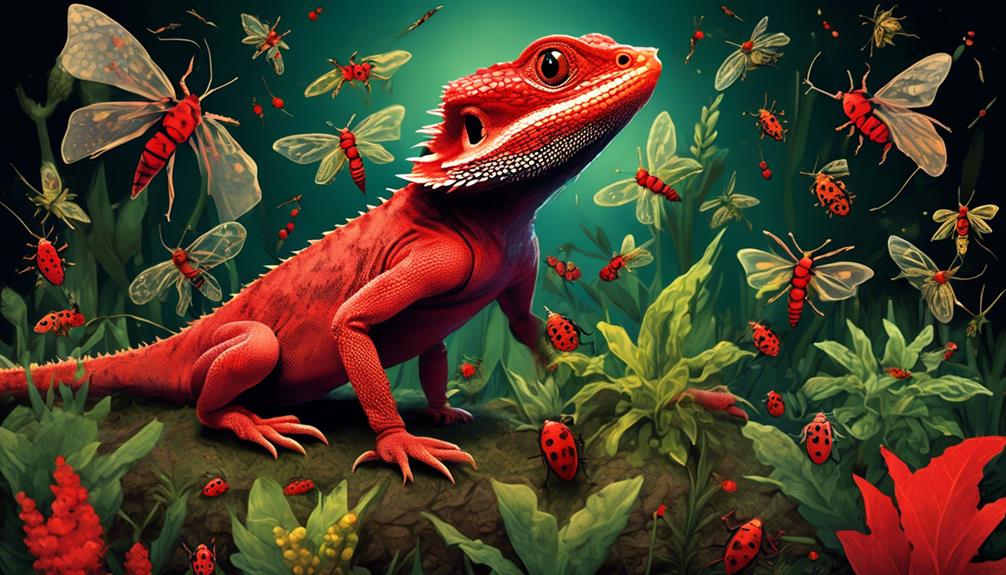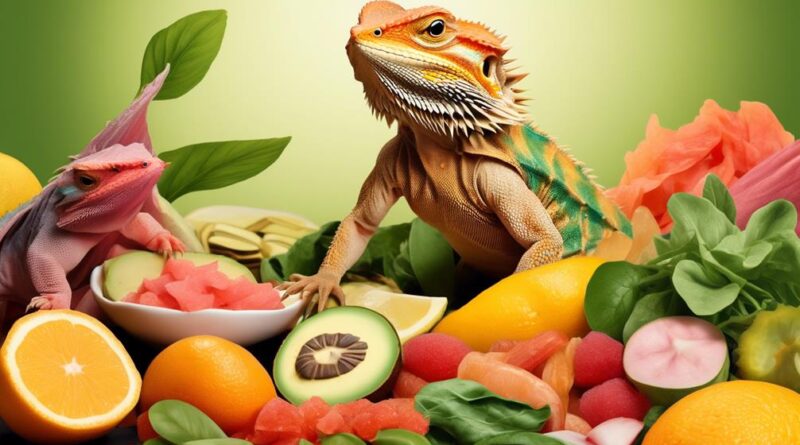What Foods Should Bearded Dragons Avoid Eating?
Bearded dragons are fascinating and friendly creatures. But when it comes to their diet, discretion is crucial. While leafy greens and insects are essential, some foods can pose a perilous predicament for these pets.
But which foods should be firmly forsaken? Understanding the forbidden fare for bearded dragons is fundamental for their health and well-being. So, let's uncover the dietary dangers that could jeopardize your scaly companion's vitality and longevity.
Citrus Fruits
Avoid feeding your bearded dragon citrus fruits, as they can cause digestive issues and lead to discomfort for your pet. The acidic nature of citrus fruits can disrupt the digestive system of bearded dragons, leading to symptoms like diarrhea, vomiting, and lack of appetite. These health effects can be distressing for your pet and may require veterinary attention.
Instead of citrus fruits, consider alternative diet choices that are safe and nutritious for your bearded dragon. Opt for a variety of leafy greens such as collard greens, dandelion greens, and mustard greens, which are rich in essential nutrients and are gentle on your pet's digestive system. Additionally, explore feeding them a mix of vegetables like bell peppers, squash, and carrots to provide a well-rounded diet.
Ensuring your bearded dragon's diet excludes citrus fruits is essential for their overall well-being. By avoiding these fruits, you can prevent potential health issues and discomfort for your pet. Instead, focus on offering a balanced and varied diet that promotes their health and vitality.
Avocado
If your bearded dragon's diet is free from citrus fruits, you should also be aware that avocados are another food to avoid feeding them. Avocado, while popular for its health benefits for humans, can be harmful to bearded dragons. This fruit contains a substance called persin, which is toxic to many animals, including birds and some mammals. Bearded dragons are also susceptible to the harmful effects of persin.
Avocado toxicity symptoms in bearded dragons may include difficulty breathing, swollen limbs, and fluid accumulation in the chest. In severe cases, it can lead to paralysis and even death. Therefore, it's crucial to keep avocados away from your bearded dragon's diet.
Instead of avocados, you can consider offering alternative fruits and vegetables that are safe for bearded dragons. Some suitable options include butternut squash, bell peppers, blueberries, and mango (in moderation). These alternatives provide essential nutrients without posing the same risks as avocados.
Rhubarb
Rhubarb can be harmful to your bearded dragon and should be avoided in their diet due to its oxalic acid content, which can bind to calcium and lead to potential health issues. Rhubarb toxicity in bearded dragons is a serious concern because oxalic acid can interfere with their digestive system and lead to the formation of calcium oxalate crystals. When ingested, rhubarb can disrupt the balance of minerals in your bearded dragon's body, potentially leading to metabolic bone disease.
The bearded dragon digestive system isn't equipped to handle foods high in oxalic acid, such as rhubarb, as it can hinder calcium absorption and utilization. This can result in nutritional deficiencies and weakened bones, causing your pet to become lethargic and prone to fractures. Additionally, the oxalic acid in rhubarb can irritate the digestive tract, leading to issues like gastrointestinal discomfort, diarrhea, and even kidney damage over time.
It's crucial to be aware of the potential risks associated with feeding your bearded dragon rhubarb, as even small amounts can have detrimental effects on their health. To ensure the well-being of your pet, always opt for safe and suitable food options that align with their dietary needs. By avoiding rhubarb and other foods high in oxalic acid, you can help maintain your bearded dragon's overall health and vitality.
Spinach
Some leafy greens, including spinach, can be harmful to bearded dragons due to their high oxalic acid content. While spinach is often considered a staple green for humans, it's best to avoid feeding it to your bearded dragon. Spinach contains high levels of oxalic acid, which can bind to calcium and other minerals, potentially leading to deficiencies and metabolic issues in your pet.
Nutritional alternatives are essential to ensure your bearded dragon maintains a healthy diet. Instead of spinach, opt for leafy greens with lower oxalic acid content such as collard greens, mustard greens, and turnip greens. These alternatives provide essential nutrients without the risk of mineral binding.
Additionally, incorporating a variety of vegetables such as bell peppers, squash, and carrots can offer a balanced mix of vitamins and minerals.
Proper dietary balance is crucial for the overall health of your bearded dragon. By avoiding spinach and offering nutritional alternatives, you can help ensure that your pet receives a well-rounded diet. Remember to consult with a reptile veterinarian or a professional breeder to develop a suitable meal plan that meets your bearded dragon's specific nutritional needs.
Providing a diverse range of greens and vegetables will contribute to your pet's overall well-being and longevity.
Fireflies
When caring for your bearded dragon, always avoid feeding them fireflies as they can be toxic and harmful to their health.
Fireflies are bioluminescent insects that produce a chemical called lucibufagins, which can be extremely toxic to reptiles, including bearded dragons.
Here's why you should steer clear of fireflies when it comes to your bearded dragon's diet:
- Toxicity: Fireflies contain lucibufagins, a toxic substance that can cause severe reactions in bearded dragons when ingested. This can lead to symptoms such as drooling, seizures, weakness, and even death.
- Natural Instincts: Bearded dragons are natural insect hunters, and they may be attracted to the glowing light of fireflies. However, it's crucial to prevent them from consuming these insects due to the potential danger they pose.
- Health Risks: Ingesting fireflies can pose significant health risks to your bearded dragon. Even a small amount of lucibufagins can have detrimental effects on their well-being, making it essential to keep fireflies out of their reach.
It's important to be mindful of the insects you expose your bearded dragon to, ensuring they're safe and nutritious for their consumption. By avoiding fireflies and being aware of potential hazards, you can help maintain the health and well-being of your beloved reptile.
Insects Caught Outdoors
If you plan to feed your bearded dragon insects caught outdoors, ensure they're free from pesticides and other harmful substances. While foraging for insects can provide a varied and enriching diet for your bearded dragon, it's crucial to be mindful of the potential risks associated with wild-caught insects.
To ensure a proper insect diet for your pet, you should prioritize safe outdoor foraging practices to minimize the likelihood of exposing your bearded dragon to harmful substances.
When sourcing insects from the outdoors, it's important to be aware of the potential exposure to pesticides, herbicides, or other chemicals that could be harmful to your bearded dragon. To mitigate these risks, avoid areas that are treated with pesticides, such as lawns, gardens, or agricultural fields. Instead, focus on gathering insects from areas known to be free from chemical treatments, such as parks or other natural habitats.
Additionally, it's essential to identify the insects you plan to feed your bearded dragon and ensure they're safe and suitable for consumption. Be cautious of insects that may have come into contact with toxic substances, and prioritize those that are known to be part of a bearded dragon's proper insect diet, such as crickets, mealworms, or roaches.
Wild Insects

You should carefully inspect wild-caught insects for any signs of exposure to pesticides or other harmful substances before feeding them to your bearded dragon. Wild insects can potentially carry harmful chemicals, so it's crucial to ensure their safety before offering them as a meal to your pet.
When it comes to incorporating wild insects into your bearded dragon's diet, there are a few important considerations to keep in mind.
- Feeding schedule
- Gut loading insects
- Variety in insect selection
First and foremost, ensure that the wild insects are introduced to your bearded dragon's feeding schedule in moderation. While they can provide valuable nutrients, it's essential to maintain a balanced diet for your pet.
Additionally, consider gut loading the insects with nutritious foods before offering them to your bearded dragon. This process involves feeding the insects nutrient-rich foods, which in turn enhances their nutritional value for your pet.
Lastly, aim to provide a variety of insect species to offer a diverse range of nutrients to your bearded dragon.
Toxic Plants
Inspecting wild-caught insects for signs of exposure to pesticides or other harmful substances is crucial before feeding them to your bearded dragon. It's equally important to be aware of toxic plants that could pose a threat to your pet's health. Bearded dragons are curious creatures and may nibble on plants within their reach, making it essential to be cautious about the greenery in their environment.
Some common indoor plants, such as lilies, daffodils, and philodendrons, are toxic to bearded dragons if ingested. Therefore, it's crucial to ensure that any indoor plants in the vicinity of your pet's living area are non-toxic.
Toxic plants can lead to a range of health issues for bearded dragons, including digestive problems, seizures, and in severe cases, organ failure. To keep your pet safe, familiarize yourself with the types of plants that could be harmful, and consider removing them from your home or relocating them to an area that your bearded dragon can't access. Implementing indoor safety precautions, such as placing plants on high shelves or using barriers to keep your pet away from them, can significantly reduce the risk of accidental ingestion.
In addition to being mindful of toxic plants indoors, it's equally important to be cautious about outdoor plants if your bearded dragon spends time in an outdoor enclosure. Always ensure that any plants within their reach are safe and non-toxic. By taking these preventive measures, you can help create a safe environment for your bearded dragon, reducing the risk of exposure to harmful plants.
Frequently Asked Questions
Can Bearded Dragons Eat Chocolate or Other Sweets?
You shouldn't feed sweet treats like chocolate to bearded dragons. Chocolate can be dangerous for them. Stick to their natural diet of insects and leafy greens to keep them healthy and happy.
Is It Safe for Bearded Dragons to Consume Dairy Products Like Milk or Cheese?
Yes, it's not safe for bearded dragons to consume dairy products like milk or cheese. They may have lactose intolerance, causing digestive issues. Consider providing dairy alternatives like calcium-rich greens, insects, or commercial reptile supplements.
Are There Any Specific Human Foods That Are Safe for Bearded Dragons to Eat as Treats?
When it comes to safe treats for bearded dragons, you can offer nutritious snacks like small pieces of fruits and vegetables. Avoid feeding them high-fat or high-sugar foods, and always consult a vet for specific dietary recommendations.
Can Bearded Dragons Consume Cooked Meats or Other Animal Proteins?
You can feed your bearded dragon reptile safe proteins like cooked meats and other animal proteins in moderation. Insects, such as crickets and mealworms, offer essential nutritional benefits, making them a great addition to their diet.
What Types of Fruits and Vegetables Should Be Avoided Due to High Oxalate Content?
When considering fruits and vegetables for your bearded dragon, it's important to be mindful of oxalate levels in greens and avoid high oxalate fruits. These can contribute to oxalate toxicity, impacting your pet's health.
Conclusion
So, remember to keep these foods away from your bearded dragon to keep them safe and healthy.
It's important to be aware of what they can and can't eat, so you can provide them with the best care possible.
By avoiding these foods, you can ensure that your bearded dragon stays happy and healthy for years to come.
